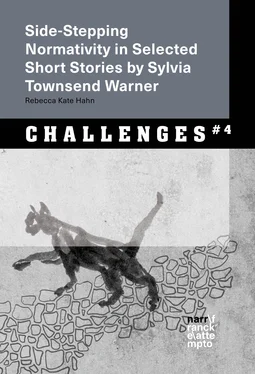This book seeks to close this gap by highlighting the way selected stories of Warner shift to off-centre positions (“Side-Stepping Normativity”) and by analysing Warner’s highly innovative narrative style, which never conforms in any way to conventional modernist or postmodernist standards. Side-Stepping Normativity in Selected Short Stories by Sylvia Townsend Warner further sets out to outline the way in which Warner constantly challenges the categories we apply to classify our surroundings and analyses how she succeeds in creating queer, that is, non-heteronormative as well as “strange, peculiar, eccentric” stories without explicitly opposing the so-called norms of her time (“Queer”, def. 1a).
Reviews and Literary Criticism of Warner’s Work
“She [Warner] has the spiritual digestion of a goat”, writes John Updike, “Her stories tend to convince us in process and baffle us in conclusion; they are not rounded with meaning but lift jaggedly toward new, unseen developments” (235). Warner’s stories begin relatively innocently and then, as in “The Grandmother’s Children”, take a surprising turn that catches the reader unaware. In keeping with Updike’s description, Warner temporarily lifts her feet off the ground to present events, characters or settings from a new and unexpected angle. This perspective is not necessarily oppositional to a more conventional perspective; however, it does contain surprising and slightly peculiar elements – for example, a dying grandmother who prefers dead children to living children, or an artist who literally seeks to become one with his work of art. While Warner’s stories are very often very realistic, they always seem to develop a taunting little twist that makes them strange. “In Writers at Work” (1931), Louise Morgan observes that Warner displays similar characteristics in real life, “She [Warner] has that same quality of unexpectedness. It is part of her personal charm that she keeps her listener constantly on the alert, and never by any chance gives him what he is prepared for” (393).
Most reviews imply that there is something bewildering about Warner’s writing, something that her readers cannot quite grasp – in addition to a certain feature that is apparent in all her writing. In the Times Literary Supplement of August 1984, for example, Anne Duchêne comments on Warner’s idiosyncratic writing style. In her article on the short story collection One Thing Leading to Another (1984), she criticises the fact that Susanna Pinney, the editor, left two of the thirteen stories undated, but points out: “Dates are of little significance, however, where there is no evolutionary change, and all stories might equally well have come from the previous two decades of the author’s writing life” (953). Duchêne draws attention to the fact that there is something unique about Warner’s style that she cannot pinpoint and continues to comment that:
She [Warner] was happiest in the liberating latitudes of eccentricity, or when she could tilt some well-fleshed verisimilitude gently over into the unlikely, or perhaps beyond that into the fantastic; but she was a modest exotic and her taste for the improbable was always tempered by good humour, good taste and good will. (953)
Duchêne also points out, like Updike, that Warner’s stories often take a turn for the unexpected. Duchêne, however, does not ascribe Warner the same amount of courage, artfulness and ingenuity as Updike. By repeatedly using the nondescript adjective “good” to refer to her, Duchêne makes her writing appear less novel and less enterprising.
While Updike and Duchêne admire Warner’s style, other reviewers find it inaccessible. In “Wit and Fancy” (1947), a review of The Museum of Cheats and Other Stories (1947), Elizabeth L. Sturch writes that
As a short-story writer Miss Sylvia Townsend Warner belongs to the school which believes in making its readers do a large proportion of the work. It is a commonplace that the farther we travel from the illustrated women’s magazines the farther removed also are the neatly tailored and explicit endings, the tidily rounded situations of the popular story. (461)
Sturch criticises the fact that Warner does not resolve her stories, but asks her readers to actively engage with them. Decades later, Maud Ellmann flatly contradicts Sturch’s assessment of Warner’s writing: while Sturch bristled at the fact that Warner tends to alienate her readers, Ellmann claims that Warner does the exact opposite, “In this critical context, a modern novelist who strives to captivate rather than to alienate the reader tends to be discounted as a throwback, lacking the gumption to burst the confines of the Victorian novel” (“The Art of Bi-Location: Sylvia Townsend Warner” 82). Sturch’s criticism has a strong misogynistic undertone, denying Warner the right as a woman to write stories that challenge her readers to think. Sturch even implies that Warner’s style displays a trace of conceit. With regard to the “exercise of imagination”, as she calls it, she maintains that
[…] it may be questioned sometimes whether too much is not expected of it, and whether readers are not deceived by intellectual snobbery into supposing that they have understood certain authors who in reality leave them completely fogged. (461)
Sturch criticises the fact that Warner deliberately eludes her readership and establishes the author as an authoritative figure whose message the reader must aim to decipher. Her review clearly shows that she considers Warner’s writing too difficult and too odd to understand. In contrast to Tóibín, she does not see any value in the strange and unfamiliar elements Warner introduces into her writing. With regard to Warner’s style, Sturch points out, “There is nothing portentous or bludgeoning about the style; and as in her previous work, the author is at her best when she is most absurd or fantastic” (461). Sturch values the fact that Warner’s writing is – supposedly – auspicious and undemonstrative; that it is, as she believes, harmless. In a similar vein to Sturch, the critic Paul Binding also finds Warner’s stories not entirely convincing. Yet while Sturch criticises their open structure, Binding considers the stories collected in The Music at Long Verney (2001), a posthumous collection edited by Michael Steinman, to be too contrived. He writes,
Her stories are very much those of the professional writer, aware of how effects can best be made in short space, of how essay-like musings can be given a narrative shape […] and of how endings – like the flamingos Alice holds in Lewis Carroll’s croquet game – can turn round and bite the reader. (23)
The above reviews highlight the controversial attitudes towards Warner’s writing. They also underpin the fact that there is something about Warner’s stories that reviewers find hard to place. Duchêne detects a timeless quality in Warner’s work but is unable to describe it further. Sturch describes Warner’s narrative style as neither “portentous” nor “bludgeoning” but does not enlarge on this. Binding disapproves of Warner’s short stories, dismissing their style, structure and content as too artificial. These widely differing opinions may be one of the many reasons why Sarah Waters writes about Warner, “The intelligence of her writing has sometimes resulted in her fiction being misunderstood as difficult, and has perhaps lost her readers; she’s certainly one of the most shamefully under-read great British authors of the past 100 years” (Waters). While I agree with the second part of Waters’ statement, I do not agree with the first premise that Warner’s writing has simply been misunderstood and labelled difficult. As the previously mentioned reviews have shown, her writing is not only difficult, but also extremely challenging. In accordance with Gay Wachman, I would argue that Warner’s writing is unexpectedly demanding: at first glance, her writing style seems innocently straightforward but as her stories progress it becomes apparent that the opposite is true. Referring to Warner’s intricate prose, Wachman writes,
Читать дальше












